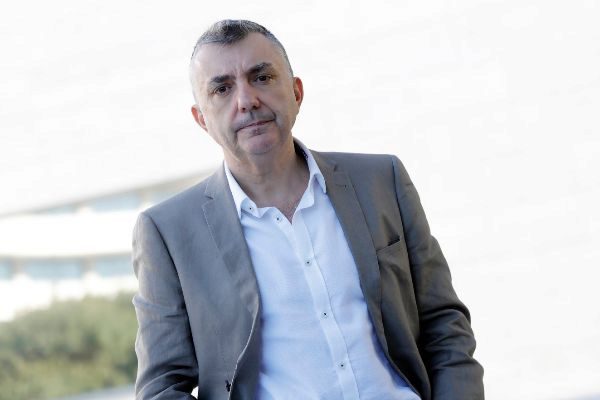- Award Manuel Vilas, finalist of the Planet
- Interview. Manuel Vilas: "I want a modern country where there are no fires in the streets"
- Planeta Award. "You won't be a Spaniard, right?" The new Javier Cercas novel
Manuel Vilas went to the Planet dinner with a dark blue tie with slight flashes of white light. There was in the elegance of his suit a dignification not only of the occasion and the place, but also of the literature that he embodies and represents. Because the last writing of Manuel Vilas, the one that began with the multi-award-winning Ordesa -translated to 14 languages- and almost closes a cycle in Alegría , is a dignification of pain and loss and how many processes urge us to move forward . You have to talk about Ordesa to talk about Alegría because Ordesa has been the novel that has brought it here. And as we speak of autobiographical literature, that here is literary and extraliterary, it is vital and it is his finalist prize, it is his exact and vertical tie as the narration of a fall and his own rescue. Those who hope to find a new Ordesa in Alegría will be disappointed, if only partially. Joy can be read, more than as a second Ordesa , as its natural consequence. The man who has told us about his breakdown as an individual in the face of the collapse of his marriage and the corrosive siege of alcohol, as a father whose children escape and as the son who lives protecting the sacred absence of his parents, has found himself, because he found the subject and wrote it. Vilas does not circumvent the comparison with Ordesa in Alegría and takes hold of that reference. Because whoever has not read Ordesa cannot understand the world of fracture restored now, nor this solar building that redeems it from new foundations.
Because there is something solar in Alegría . There is something healing. The themes are the same, but in another biographical moment: the protagonist goes through the airports and hotels of the world thanks to the success of his previous novel, with the focus always placed in Spain and the United States, especially Iowa and Chicago. There is a new approach that is a turning point about his narrative: the mood . Because everything in Ordesa is tearing and demolition, which gives his writing an intimate glow of dramatic intensity in that collective narrative not only of the fall of the middle class, but of the personal ending that every human being has to live to to recognize oneself in its ashes, in Alegría it becomes a placid acceptance of any existence. That is to say: after the greatest anxiety, with its high fever, with the bones tense with inner courage and the agony caught between the nail and the flesh , one comes to understand that we are alive, that our parents or their absences live, that our children they live, and that our writing lives and will not perish; but not because of the absurdity of posterity, but precisely because everything that once lived and meant something to someone reached their passion, their dignity provided with an infinite sense.
«All that we love and lose, that we love very much, that we love without knowing that one day it would be stolen from us, everything that, after its loss, could not destroy us, and well that it insisted with supernatural forces and sought our ruin with cruelty and determination , it ends, sooner or later, turned into joy ». In this portentous beginning is the book, with that winged and protective shadow in the appointment of José Hierro. Because Manuel Vilas is an electric poet from his testimony in the arena of living also in his novels, which are prose poems with vertigo in the blood. That is why he has raised his own saying with Barbastro erected at the epicenter of the confession, between stellar moments such as the dream of the family paella with Lorca playing the piano, because Lorca is Spain.
Manuel Vilas does not run away from the mirror and finds himself and us . He announces that we may end up in a house on the periphery, forgotten and alone, and that the psychic torment is the worst of evils; but everything will be worth it, even if we are the most defenseless beings on Earth, because the children carry the best light in a hotel room in Chicago, restoring the gesture of fragility when sleeping of those children who were. Joy is the gift of being a son and of being a father or the distance of light years between how much we had and the future absence we will be.
"The worst thing you can ask a father or mother who sees little of their children is how their children are," he writes. It is true. But we must defend our daytime joy with breaths of air. Because it goes ahead, because life always protects us from ourselves and our abysses.
According to the criteria of The Trust Project
Know more- culture
- literature
- Planet Award
The Sphere of PaperSofia Tolstaia, the husband's arrogance
LiteratureThe Wild Writing of Cristina Morales, National Narrative Award 2019
The Paper Sphere Anna Pacheco, shame of class in millennial code

